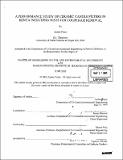A performance study of ceramic candle filters in Kenya including tests for coliphage removal
Author(s)
Franz, Amber, 1982-
DownloadFull printable version (15.38Mb)
Other Contributors
Massachusetts Institute of Technology. Dept. of Civil and Environmental Engineering.
Advisor
Susan Murcott and Martin Polz.
Terms of use
Metadata
Show full item recordAbstract
Approximately 80% of all diseases in the developing world are caused by contaminated water (GDRC, 1999). In response to this crisis, decentralized point-of-use systems, such as ceramic candle filters, have emerged as viable options for improving water quality at the household level. This thesis evaluates the performance of five brands of ceramic candle filters that are locally available in the developing nation of Kenya: the AquaMaster (Piedra candle), Doulton Super Sterasyl, Stefani Sao Joao, Pelikan, and Pozzani candles. Filters were evaluated based on turbidity removal, flow rate, total coliform and E. coli removal, and cost. The Pelikan filters were also subjected to tests for viral removal using MS2-coliphages. Results from studies indicated that the Pelikan filters were the most effective at removing turbidity from Charles River water (97% reduction). Turbidity removal by other filters ranged from 88%-94%. Results from studies utilizing more turbid Nairobi water showed filters to reduce turbidity by 97%-99%. Results from flow rate studies performed at MIT revealed the Doulton Super Sterasyl to possess a significantly greater flow rate (0.55 L/hr) than the other brands. The flow rates of the other filters ranged from 0.14-0.26 L/hr. Filter tests utilizing the more turbid Nairobi water showed flow rates of 0.09-0.24 L/hr. Results from coliform removal studies performed at MIT showed the AquaMaster (Piedra candle), Doulton Super Sterasyl, and Pelikan filters to remove significantly more total coliform and E. coli than the Pozzani filters. Percent removal by all filters tested at MIT ranged from 92%-<100%. Filter tests performed in Kenya showed percent total coliform and E. coli removals of up to 99.995%. (cont.) The Pelikan filters were the cheapest filters purchased, retailing for $2 in Nairobi. Results of viral removal studies indicated that the Pelikan filters were not effective at removing viruses from solution. The results of this study support the use of Pelikan filters as an inexpensive and integral step in the household water treatment process. Sedimentation and/or coagulation are recommended pre-filtration if highly turbid water is to be filtered. This action will ensure a higher flow rate. Additionally, disinfection is recommended post-filtration to remove any residual bacteria.
Description
Thesis (M. Eng.)--Massachusetts Institute of Technology, Dept. of Civil and Environmental Engineering, 2005. Includes bibliographical references (leaves 78-82).
Date issued
2005Department
Massachusetts Institute of Technology. Department of Civil and Environmental EngineeringPublisher
Massachusetts Institute of Technology
Keywords
Civil and Environmental Engineering.